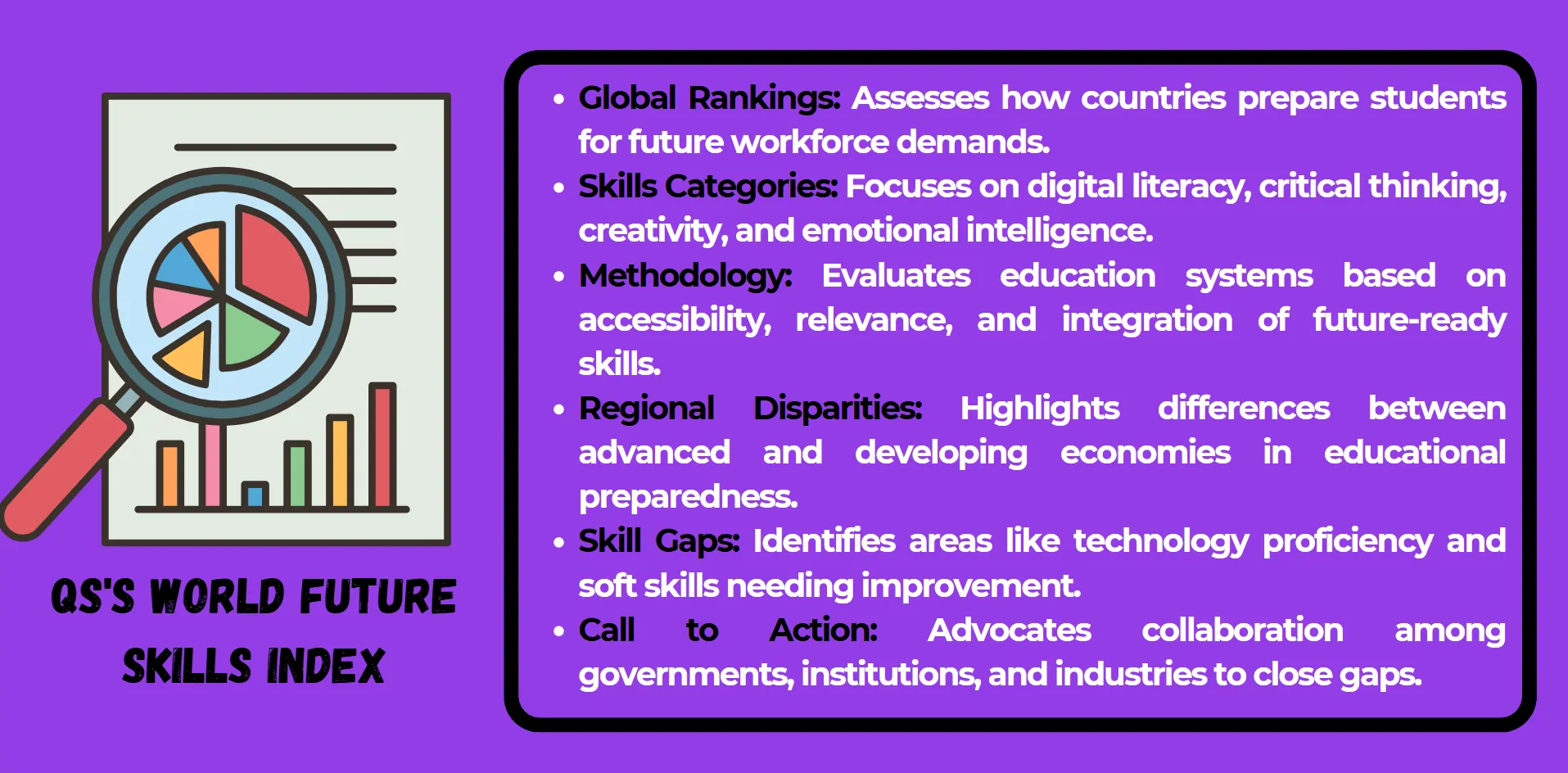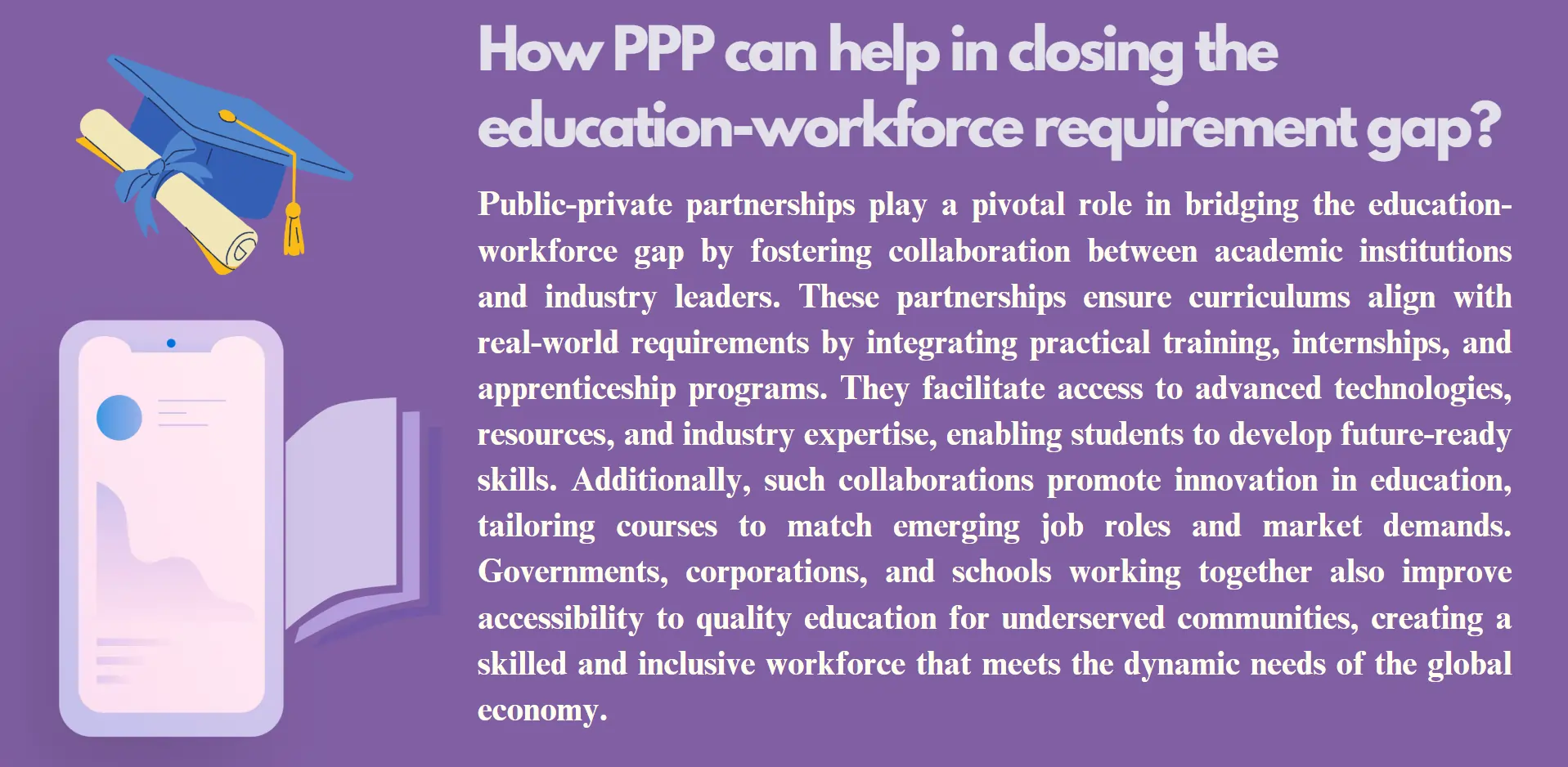The results of the QS's World Future Skills Index and the World Economic Forum's Future of Jobs Report 2025 highlight how urgent it is to adapt educational practices to the changing needs of the global economy.

A thriving global economy depends on workers who are prepared for the challenges of the modern era through technological progress, shifting industry frameworks and automation trends. Research conducted by Future of Jobs Report 2025 and World Future Skills Index by QS
demonstrates sharp differences between existing educational methods and essential workplace
capabilities for upcoming professional needs. The reports show that education systems need to update teaching
methods promptly because they must train people with essential capabilities such as analytical skills and technology
fluency along with emotional intelligence development. Fields are undergoing an explosive change rate so the necessary connection
between academic plans and real-world economic conditions became mandatory. This Article investigates essential information
from notable reports to present creative methods for overcoming skill deficits. This effort targets educators,
government officials and industry executives to promote teamwork dedicated to developing students for contemporary threats and possibilities.
The Future of Jobs Report 2025 | World Economic Forum
An extensive evaluation of global job market evolutions appears in the World Economic Forum’s Future of Jobs Report 2025. Through its analysis the study reveals main directions alongside upcoming possibilities and upcoming difficulties.
Key Drivers of Change
The research document presents artificial intelligence alongside machine learning and automation as the dominant transformative forces which reform the professional landscape. These technologies transform existing positions into something new thereby generating employment opportunities that need complex digital and cognitive capabilities. The focus on sustainability as well as green technologies creates new job positions which include renewable energy specialists, carbon management experts and eco-friendly innovators.
Emerging Job Roles and Declining Occupations
A primary finding revealed through the report demonstrates how new job categories formed within data analysis, AI development and the growing gig economy. Such job types are growing essential because industries need to adapt to digital integration. Repetitive data entry work together with factory production manual tasks will substantially diminish in the future. The research shows how essential it is to provide workers with enhancement training that prepares them for evolving changes in their industries.
The Impact on Employment Structures
The analysis of future employment is immediately followed by a look at shifting employment trends. Urgent workplace transformations due to remote work and hybrid models drive organizations to hire professionals skilled in virtual communication and remote team collaboration. These changes require innovative strategies for effective workforce management because they alter how employers handle employees situated across wide geographical locations.
The Urgency of Reskilling and Up-skilling
The report highlights time and again the essential requirement to retrain and advance the work skills of employees. The research indicates that about half of all workers need skill modification within upcoming years thus emphasizing the necessity for constant learning. The transformation requires active collaboration between states together with private companies and education facilities according to policy makers.
Closing the Global Skills Gap
The report reveals that developing economies encounter more hurdles than developed economies do in obtaining resources for workforce development skills. Equal economic development and an inclusive workplace require immediate solutions for the worldwide shortage of qualified personnel.
The 2025 Future of Jobs Report functions as an essential roadmap which helps people understand and prepare for upcoming trends in work. The relationship between technology, education and policy elements serves to develop workforce capabilities that meet tomorrow's business requirements.
QS World Future Skills Index
The QS World Future Skills Index gives essential worldwide insights about how prepared nations are to provide students with necessary future workforce aptitudes. The study provides a basic understanding of the global trend in education.
Methodology and Objectives of the Index
The QS World Future Skills Index evaluates nations' capacity to produce students with next-generation skills and assigns rankings to them. The measurement system integrates various elements from curriculum development to technology availability and business sector partnership. The index serves as an evaluation tool to measure national performance regarding the development of essential capabilities including digital literacy and problem-solving along with creativity and adaptability which form the basis for present and evolving job markets.

Global Rankings and Insights
The evaluation system establishes major differences between national systems which focus on developing future-oriented abilities. The United States and Germany are leading nations for teaching occupation-specific competencies whereas emerging economies demonstrate starting strength but their boundaries stem from inadequate infrastructure and scarce resources. The index underscores that key advances made in certain locales still permit widespread impairments when implementing essential abilities throughout educational institutions globally.
Skill Gaps and Challenges
Advanced technological competency and emotional intelligence represent major global competency gaps which emerge throughout the QS Index assessment. Public and private partnerships with educational institutions need to strengthen to bridge the current education system gaps. Building connections between these gaps ensures the development of an employee base which encompasses every nation and population segment.
The QS World Future Skills Index functions as an essential instrument which shows worldwide education readiness conditions. It encourages stakeholders to actively develop innovative strategies which give future learners strong capabilities to succeed in an advancing economic landscape.
The Impact of Evolving Demands on Education
Rapid changes in the global economic climate force educational institutions to develop learning strategies that teach new capabilities for students to handle upcoming challenges.
Bridging the Gap
Evolutionary demands resulted in the growing gap between educational teaching contents and corporate workforce requirements. Modern educational systems continue to focus on traditional memorization techniques instead of teaching students essential competencies like critical problem-solving and digital competency along with collaborative abilities. The development of learning models based on skills and practical competence academia needs for present economic requirements represents the solution to narrow this educational gap.
The Integration of Digital Technologies in Learning
Schools must teach digital skills because automation together with artificial intelligence requires such abilities. Modern educational institutions use technology platforms to deliver better learning results coupled with developing their students' tech-capabilities for the digital economy. The basic elements of modern education now include virtual reality and artificial intelligence-based teaching assistants as well as hands-on coding instruction to equip students for technological careers in the future.
The Role of Interdisciplinary Learning
Interdisciplinary education stands as a major demand of present times. Learners now receive growing encouragement from employers to learn across multiple professional domains because their role positions require integrated knowledge from different fields. Learning environmental science data analytic principles can create career readiness for sustainable professions. Institutions throughout the world now implement this method to develop flexible adaptable professionals.
Lifelong Learning as a New Paradigm
Lifelong learning initiatives have emerged to replace the out-dated belief that “learning happens only at a specific point in time”. Working individuals need to consistently grow their expertise to remain useful in continuously changing industries. Through joint efforts between governments along with both corporate entities and educational institutions online learning and skills certification programs support on-going learning.
Addressing Educational Inequality
Modern educational requirements reveal several disparities among learners regarding quality education accessibility. The implementation of modern educational strategies remains difficult for developing areas because they face monetary restrictions together with insufficient infrastructure. The universe must tackle the inequalities to establish worldwide advancement and equal educational possibilities for students everywhere.
The economic changes have made a distinct impact on education systems worldwide. Success in teaching students to handle future requirements becomes achievable through implementing modern strategies together with comprehensive inclusivity in educational frameworks.
Challenges in Aligning Education with Workforce Needs
The process of making education systems match workforce requirements proves to be an intricate process that changes frequently. A complete change of perspective regarding standard approaches is necessary to make global economies stable yet competitive.
- Out-dated Curriculums and Teaching Methods: The main education obstacle exists from out-dated curriculums which fail to teach necessary skills needed for contemporary industries. The educational systems of today allocate most emphasis to theory-based learning instead of practical hands-on skills which employers need in the current workforce. Lack of advanced training access among teachers creates a situation where students receive substandard preparation for upcoming challenges.
- Resistance to Change: Institutions together with governments encounter significant obstacles to educational modernization because of internal opposition to change. Bureaucracy together with traditional thinking patterns creates delays in implementing new strategic approaches. The gap between businesses' requirements and graduate capabilities creates industrial delays due to inertia which affects workforce preparation ability.
- Unequal Access to Resources: Structural inequalities regarding the availability of educational excellence and technological components maintain substantial obstacles. Developed nations put significant financial resources into digital integration alongside new educational standards but numerous underdeveloped areas face obstacles in attaining digital resources, funding and lack necessary political support for modernization. The lack of equality contributes to expanded skills differences while increasing the global economic variations.
- Balancing General and Specialized Skills: The challenge arises from achieving the proper equilibrium between standard education subjects and expert-level subject knowledge. The industrial landscape requires specialized training in areas such as data science as well as AI and green technologies together with the essential core skills of critical thinking and communication. Modern educational systems face the difficult task of teaching standard breadth of knowledge as well as specialized technological skills.
The solution demands three-way collaboration between government bodies, educational sectors and private organizations. The future workforce demands will be effectively addressed when education system develops innovation alongside inclusivity and adaptability.
Recommendations and Strategies for Future-Ready Education
The sustainable growth of both the economy and individual accomplishment depends on an educative system which adapts to global workforce needs. Several practical approaches exist to develop education systems which will be ready for the future.
Leveraging Public-Private Partnerships
To close the education-workforce requirement gap government entities must cooperate with educational facilities and commercial institutions. Public-private collaborations empower schools to design curricula matching real-life requirements and establish student internships and apprenticeships and provide expert mentor support. The educational programs guarantee students receive both practical competencies and relevant skills for industrial applications.

Integrating Technology in Learning
The educational sector can undergo transformative changes by implementing technological tools including AI-driven platforms with virtual labs together with learning modules. The technological progress allows customized educational delivery dependent on personal needs and supports students to develop digital competencies. Accessible technology resources need investment from schools to create equal educational possibilities between different geographical areas.
Promoting Lifelong Learning
Education requires permanent learning to become an indispensable principle because the modern workforce continues to undergo rapid job changes. Institutions together with governments should create online educational resources and flexible learning programs that enable people to continuously enhance their skills through micro-certifications. A grip on continuous education creates employees who remain flexible and strong in the face of change.
Encouraging Global Collaboration
Reaching agreement worldwide proves essential for resolving skill gaps while enabling teams to exchange their superior methods. Academic institutions through international partnerships enable students to gain multicultural educational experiences and implement dual exchange programs and develop combined curriculum milestones. Through these initiatives people gain improved abilities which leads to developing employees who operate competently in global markets.
Focusing on Soft Skills Development
Organizations should develop essential soft skills including communication together with adaptability and emotional intelligence in addition to technical qualifications. Educational institutions need to develop programs which enhance social abilities and creative thinking and team collaboration to develop versatile graduates who succeed in multilingual spaces.
Conclusion
The worldwide demand for developing future-ready workforce stands as an immediate necessity given continuous rapid changes across industries. Research conducted by the World Economic Forum Future of Jobs Report 2025 along with QS’s World Future Skills Index demonstrates that educational methods must match present economic requirements. Through progressive teaching approaches and worldwide networking activities together with skill-based training initiatives education institutions create opportunities for students to succeed in evolving workplace conditions. Belief in sustainable workforce preparation for the future requires policymakers to team with educators and industry leaders in creating a prepared professional framework.